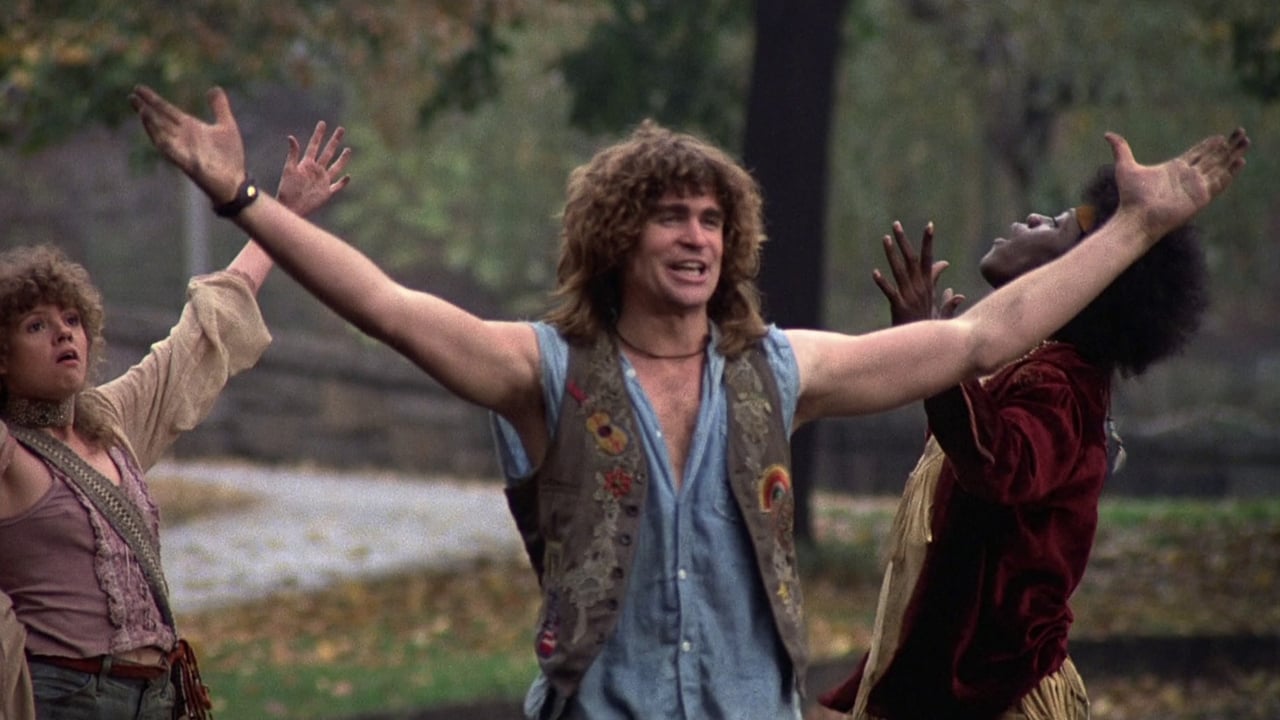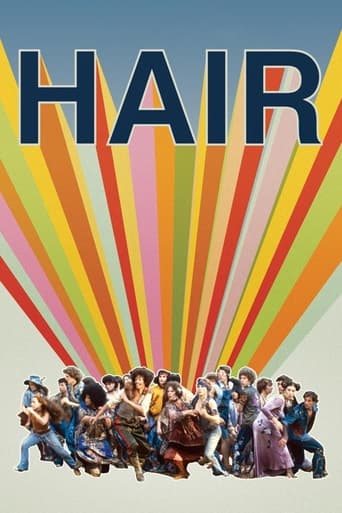davethemathtutor
Well, I've finally seen this hallowed cultural icon of the Sixties, and I gotta say, it stinks. It's a musical, and that's a lot of what's wrong with it: "Age of Aquarius" and "Let the Sunshine In" are pretty good songs, and "Easy To Be Hard" is passable, I guess, but all the rest are just awful, with unmelodic music and pretentious lyrics. The dancing is good, and Twyla Tharp's choreography is excellent, but that can't make up for the lousy songs.Then there's the story. Treat Williams stars as the leader of a small band of hippies, and his character strikes me (at age 68) as pretty obnoxious. Did director Milos Forman really intend for the hippies to come across as such smug, narcissistic jerks? *Were* we such smug, narcissistic jerks? I wonder.All in all: An embarrassment to all us old ex-flower children.
rodrig58
Finally I saw it on an original videotape(the first time in Romania I saw a black and white censored copy). The music is excellent. The actors are brilliant, especially John Savage, Treat Williams and the beautiful and sensible Beverly D'Angelo. But Annie Golden, Dorsey Wright, Don Dacus, Cheryl Barnes, are also very good. In a small role, as The General, a great director, Nicholas Ray(who made Rebel Without a Cause and Johnny Guitar, among many other great films). I simply love Milos Forman, specially for One Flew Over the Cuckoo's Nest and Amadeus. With Hair, he offered me a great surprise, the film is really great, not only because of the music(signed Galt MacDermot), but also for the pacifist message, which goes to my heart. One of Cinematographers is Miroslav Ondrícek, who signed the image for Amadeus too(along for more other great movies). To be seen and watched again and again.
ElMaruecan82
"This is the dawning of the Age of Aquarius…" perhaps the most memorable singing moment of "Hair" praying for a new age to come, an age with more "harmony and understanding, sympathy and trust abounding…" Like so many great musicals, the essence of the film is present all through the magic of the songs and their penetrating lyrics, like many classics, no singing part feels unnecessary, each one has a beautiful, sincere and gutsy message to convey, something we all owe to the generation that grew during the most troubled times of our modern history. For someone who was born in the 1980's, and missed a lot from the world's history, I grew with the idea of "Hair" being a sort of hymn of the hippie-movement, with hairy teenagers singing for the peace in the world, and a never-ending communion between nature and humanity … that was 1967, the world was living a series of revolution that could have painted it in red, USA were embarked in the hellish Vietnamese crusade, the baby-boom generation was becoming adult, and constituted a political and social force that could have unbalanced the whole system. Indeed, in 1967, the future of the worlds was at stakes, everything was possible, the arts were boiling in the minds of talented newcomers, even Hollywood was enduring a revolution … the song "Where Do I Go?" was the spirit that inhabited the hearts of many people in the world, the hippies and the other revolutionists could never have become "has been" simply because their minds were constantly turned to the future, but 1969 and the 70's crisis came and all they could do next was to mourn the dead dream of what the world "could have been": a beautiful utopia …Now, the question would be why a film adaptation of "Hair" in 1979, 12 years after the original play, when the Vietnam war became a painful memory, when the Manson crimes in a tragic August summer killed all the dreams of harmony and fraternity and showed how the degeneracy that could inspire some crimes couldn't ask for a flower in a gun, but for real bullets, when Nixon had already resigned, when people were living in their everyday life the consequences of the Oil Crisis, when even artistically, the Disco was the new trend, the Punk movement was shouting the anger of a generation with no future, and families were back to a new consumerist era, why making this cinematic anachronism? The idea is probably behind the fact that the movie didn't follow the original story, and Milos Forman allowed himself some liberties that probably served "Hair" by extending its spirit over the setting of 1967 and elevating to a more subversive area where even the hippies are portrayed with objective flawed… always politically correcting, but never gratuitously subversive, the film carries an inspiring message with an exciting entertaining value.Milos Forman had a unique talent to portray irreverent characters with a heart burning inside them, rather it's genius, or faithfulness to their convictions, whether they're named McMurphy, Flynt, Mozart or Kaufman, never had rebellion been so cinematically flamboyant, so able to touch our hearts and our souls. In "Hair", this irreverence isn't carried by a name, but a group, to call them "hippies" is just a convenient wording, the group only shines through its contrast with the two main characters, Claude Bukowski, a new draftee about to go to Nam, played by a convincing John Savage and Sheila Franklin an upper-class free- spirited girl, played by Beverley D'Angelo. The evolution of their romance is so sweetly handled that it never feels forced or stereotypical, and it allows them to behave as the straight men of character who rather look or feel crazy, among them, Treat Williams, the real star of the show, portraying Berger, a man who like the others, chose to live, according to his beliefs. In the original, from what I read, they were all rebellious, while in "Hair" we're allowed to have glimpses of normality, until being disturbed by the path where 'our' normality leads to, indeed we'd rather be crazy like Berger or Hud, than brainwashed like the check-point guard or castrated like Sheila's friend.Like in "One Flew Over the Cuckoo's Nest" or "The People vs. Larry Flynt", the antagonists or the villains are transcended by much more global entities, call them system, establishment, government, it's a mighty power that belittles us. In "Hair", all the songs work like rally cries of defenses against this society where the group, the solidarity, is the only force than can prevail. In the film, almost all the taboos are broken, sexual, racial, but never with a polemical tone, rebellion doesn't forbid style and flashiness, the crude words, the profanities, the racial slurs or stereotypes are mocked with a delighted humor that transcend their taboos with a poetic beauty. A song makes a comparison between white and black men from the point of view of libidinous women, the titular song "Hair" is introduced when a character refuses to get his haircut, like an illustration of the ultimate source of freedom: to let them grow like we would for a plant. "Hair" is part of a sacred body, and body isn't a taboo anymore … Never ostentatious, the movie celebrates this wind of liberty with joy, anger, sadness and a sincerity of heart, culminating with the "Let the Sunshine In" song with all the people joined in Washington.Whether this heritage is still valued or followed might not be the point, after all, many hippies were finally engulfed in the same establishment they denounced, the point is simply that the message of "Hair", its pacifism, environmentalism, sexually and socially exhilarating truth, were sung once, and who knows, maybe one day, will come another "Age of Aquarius"

